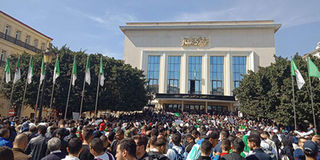Breaking News: CDF Ogolla involved in KDF chopper crash
Return of the Arab Spring and the time for African rainmakers

Algerians participate in a protest rally against their ailing President Abdelaziz Bouteflika's bid for a fifth term in power, in the northeastern city of Annaba on March 5, 2019. PHOTO | AFP
What you need to know:
- Bashir has started his swan song. In power that he seized in a 1989 military coup, the Sudanese strongman is surely in his last months in power.
- The struggles against the Mount Kenya told us the time for Africa in general to manage for environmental crisis is finally here.
Sometimes the world changes so slowly that we miss it. And at other times it changes too quickly, we miss it too.
In the past few days, we have seen quite a bit of each of those two realities.
Closest home, Sudan’s President Omar al-Bashir, facing relentless protests that are into their third month, and having failed to stem them with the declaration of a state of emergency, handed the leadership of the ruling National Congress Party to his deputy Ahmed Harun — until the next party election.
However, in reality, Bashir has started his swan song. In power that he seized in a 1989 military coup, the Sudanese strongman is surely in his last months in power.
Further north, Algeria’s strongman Abdelaziz Bouteflika, in power since 1999, announced he was running for a fifth term in elections next month.
Actually, he himself didn’t announce. One of his henchmen did it for him, because since he suffered a stroke in 2013, Bouteflika has not spoken in public.
OUSTED
Now largely paralysed, he won the 2014 election without campaigning. This time, others are again acting and speaking on his behalf.
If you watched that wonderful 2009 film Avatar, Bouteflika’s situation in Algeria is the closest to it in real politics. His avatar is his powerful brother Said Bouteflika.
Algerians are outraged, and they are protesting, even after a statement attributed to the president said he would serve only one year if elected, and then go away.
But what is really happening in Sudan and Algeria is the unfinished business of the Arab Spring of 2011, which ousted Tunisia’s Zine El Abidine Ben Ali, Egypt’s Hosni Mubarak and, dramatically and tragically, Libya’s Muammar Gaddafi at the end of the year.
LIBERATION
Maybe we need to revisit the Arab Spring, and youthful protests in Africa again. We wanted them to have immediate effect, but maybe they will simmer and fester for years.
They are probably much like rap music, and hip pop. In 1981, I was still a little man, but I thought I knew my music.
When Quincy Jones released his mega album, The Dude. I was appalled by the rap. My younger brother, more attuned to how the world was changing, told me that rap and hip pop were going to be huge in the years to come.
I said no. We took a bet. Many years later, I am still buying the fellow beer. I was totally wrong.
Perhaps the Arab Spring has only just started. And, we were also wrong not to see them as part of the post-Cold War “second” and “third liberation” waves that swept Sub-African Africa between 1992 and 2005.
ADAPT
Further up in the skies, for over a week, devastating fires have raged in Mount Kenya National Park.
When the Kenya National Parks Service (KWS) last spoke about the fires, they said they had already destroyed more than 80,000 hectares of forest and grassland, nearly half the area of the park.
Other reports said there have been 100 smaller fires in the Mount Kenya National Park this year alone!
It looked like the battle was going to be lost until, as the west Africans would say, the skies opened up and the rain gods urinated on the fire.
Against a backdrop of looming drought in the Sahel and southern Africa, and some of the highest temperatures recorded in many parts of the world since records were kept, the environmental game has truly changed.
The struggles against the Mount Kenya told us the time for Africa in general to manage for environmental crisis is finally here — or has even passed, for some countries.
BANKS
There was a time when, beside the dictator in State House, the most important job in most of Africa was Army Commander.
I think that soon, the most important job in Africa is going to be Rainmaker. Not the one who wears ostrich feathers and leopard skin, but the one who looks through some scientific device and makes the call on the climate.
Down south, from Zimbabwe, we learnt that, unable to get funding from foreign lenders due to arrears of more than $2.4 billion and an economy that has continued to tank despite the exit of the disastrous Robert Mugabe, the country’s Reserve Bank has borrowed $985 million from African banks.
A few days ago, it was reported that Zimbabwe had borrowed $600 million from neighbouring Botswana to keep it afloat, but Botswana’s President Mokgweetsi Masisi has said no cheque had been written yet for Harare.
This is a change and chance for African banks and even governments to lend to the badly run or struggling economies, make some money if they are lucky, or gain political leverage.
Not exactly what many had in mind when they talked of “African solutions for African problems”, but we will take it.
Mr Onyango-Obbo is the publisher of Africapedia.com and explainer Roguechiefs.com. @cobbo3Online DN





